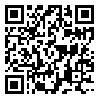دوره 6، شماره 3 - ( 4-1399 )
جلد 6 شماره 3 صفحات 155-147 |
برگشت به فهرست نسخه ها
چکیده: (2300 مشاهده)
Background: Tension and migraine headaches are the most prevalent types of headaches. Some emotional and psychological factors are associated with these headaches.
Objectives: To elucidate the nature of individual differences in emotion regulation and repetitive negative thinking among patients with tension headaches and migraine and compare it with normal subjects.
Materials & Methods: In this cross-sectional, comparative study, the participants consisted of patients with tension headaches and migraine referring to the two neurology clinics in Isfahan City, Iran from 2019 to 2020. A diverse sample of patients (n =240) completed the difficulties in emotional regulation scale and perseverative thinking questionnaire. The Chi-square tests, Fisher’s exact test, GLM (generalized linear model), Tukey post hoc test, and LSD (least significant difference) test were used to analyze the obtained data in SPSS V. 21.
Results: The results indicated that patients with a high level of repetitive negative thinking reported increased difficulties in emotional regulation and impulse control, limited access to emotion regulation strategies, and lack of emotional clarity (P<0.05). Moreover, the tension headaches group showed a higher level of difficulties in emotional regulation and repetitive negative thinking than the migraine and control groups (P<0.001).
Conclusion: Weak emotional regulation and repetitive negative thinking are associated with migraine and, especially tension headaches. Therefore, therapeutic plans based on emotion regulation and thinking problems should be considered as a complementary and necessary treatment for these types of headaches.
Objectives: To elucidate the nature of individual differences in emotion regulation and repetitive negative thinking among patients with tension headaches and migraine and compare it with normal subjects.
Materials & Methods: In this cross-sectional, comparative study, the participants consisted of patients with tension headaches and migraine referring to the two neurology clinics in Isfahan City, Iran from 2019 to 2020. A diverse sample of patients (n =240) completed the difficulties in emotional regulation scale and perseverative thinking questionnaire. The Chi-square tests, Fisher’s exact test, GLM (generalized linear model), Tukey post hoc test, and LSD (least significant difference) test were used to analyze the obtained data in SPSS V. 21.
Results: The results indicated that patients with a high level of repetitive negative thinking reported increased difficulties in emotional regulation and impulse control, limited access to emotion regulation strategies, and lack of emotional clarity (P<0.05). Moreover, the tension headaches group showed a higher level of difficulties in emotional regulation and repetitive negative thinking than the migraine and control groups (P<0.001).
Conclusion: Weak emotional regulation and repetitive negative thinking are associated with migraine and, especially tension headaches. Therefore, therapeutic plans based on emotion regulation and thinking problems should be considered as a complementary and necessary treatment for these types of headaches.
| بازنشر اطلاعات | |
 | این مقاله تحت شرایط Creative Commons Attribution-NonCommercial 4.0 International License قابل بازنشر است. |


